

E-Books → The Texts of Early Greek Philosophy The Complete Fragments and Selected Testimonies of the Major Presocratics
Published by: voska89 on 26-02-2023, 16:10 |  0
0
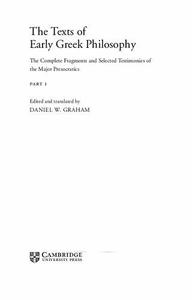
The Texts of Early Greek Philosophy: The Complete Fragments and Selected Testimonies of the Major Presocratics By Daniel W. Graham
2010 | 1040 Pages | ISBN: 0521845912 | PDF | 40 MB
This two-part sourcebook gives the reader easy access to the language and thought of the Presocratic thinkers, making it possible either to read the texts continuously or to study them one by one along with commentary. It contains the complete fragments and a generous selection of testimonies for twenty major Presocratic thinkers including cosmologists, ontologists, and sophists, setting translations opposite Greek and Latin texts on facing pages to allow easy comparison. The texts are grouped in chapters by author in a mainly chronological order, each preceded by a brief introduction and an up-to-date bibliography, and followed by a brief commentary. Significant variant readings are noted. This edition contains new fragments and testimonies not included in the authoritative but now outdated Fragmente der Vorsokratiker. It is the first and only complete bilingual edition of the works of the Presocratic philosophers for English-speakers.
E-Books → Greek and Roman Slaveries
Published by: voska89 on 25-02-2023, 09:22 |  0
0
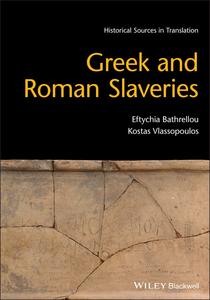
Greek and Roman Slaveries
English | 2022 | ISBN: 1118969294 | 399 Pages | EPUB (True) | 5 MB
Slavery was foundational to Greek and Roman societies, affecting nearly all of their economic, social, political, and cultural practices. Greek and Roman Slaveries offers a rich collection of literary, epigraphic, papyrological, and archaeological sources, including many unfamiliar ones. This sourcebook ranges chronologically from the archaic period to late antiquity, covering the whole of the Mediterranean, the Near East, and temperate Europe.
E-Books → The Female Characters of Fragmentary Greek Tragedy
Published by: voska89 on 23-02-2023, 00:20 |  0
0
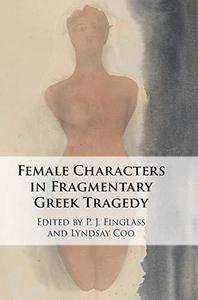
The Female Characters of Fragmentary Greek Tragedy By P. J. Finglass; Lyndsay Coo
2020 | 300 Pages | ISBN: 1108495141 | PDF | 2 MB
How were women represented in Greek tragedy? This question lies at the heart of much modern scholarship on ancient drama, yet it has typically been approached using evidence drawn only from the thirty-two tragedies that survive complete - neglecting tragic fragments, especially those recently discovered and often very substantial fragmentary papyri from plays that had been thought lost. Drawing on the latest research on both gender in tragedy and on tragic fragments, the essays in this volume examine this question from a fresh perspective, shedding light on important mythological characters such as Pasiphae, Hypsipyle, and Europa, on themes such as violence, sisterhood, vengeance, and sex, and on the methodology of a discipline which needs to take fragmentary evidence to heart in order to gain a fuller understanding of ancient tragedy. All Greek is translated to ensure wide accessibility.
E-Books → Localism and the Ancient Greek City-State
Published by: voska89 on 22-02-2023, 23:08 |  0
0
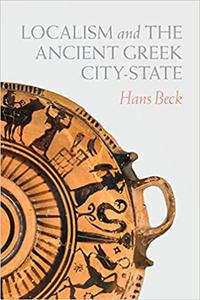
Hans Beck, "Localism and the Ancient Greek City-State"
English | ISBN: 022671148X | 2020 | 304 pages | PDF | 5 MB
Much like our own time, the ancient Greek world was constantly expanding and becoming more connected to global networks. The landscape was shaped by an ecology of city-states, local formations that were stitched into the wider Mediterranean world. While the local is often seen as less significant than the global stage of politics, religion, and culture, localism, argues historian Hans Beck has had a pervasive influence on communal experience in a world of fast-paced change. Far from existing as outliers, citizens in these communities were deeply concerned with maintaining local identity, commercial freedom, distinct religious cults, and much more. Beyond these cultural identifiers, there lay a deeper concept of the local that guided polis societies in their contact with a rapidly expanding world.
E-Books → Humanism The Greek Ideal and Its Survival
Published by: voska89 on 19-02-2023, 01:42 |  0
0
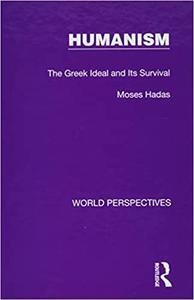
Moses Hadas, "Humanism: The Greek Ideal and Its Survival "
English | ISBN: 1032187034 | 2021 | 144 pages | EPUB | 134 KB
Originally published in the UK in 1961 this was an unconventional book when first published but a powerful interpretation of Greek individualism. The author examines the influence of the Greeks on European philosophy, religion, literature, art and architecture and challenges many commonly held assumptions: 'Those items in the Greek legacy which are most easily recognizable as such are in fact the least important.'
E-Books → Halicarnassus The History and Legacy of the Ancient Greek City and Home to One of the Seven Wonders of the World
Published by: voska89 on 19-02-2023, 01:10 |  0
0
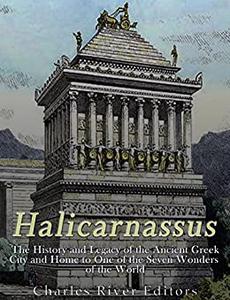
Halicarnassus: The History and Legacy of the Ancient Greek City and Home to One of the Seven Wonders of the World by Charles River Editors
English | December 7, 2016 | ISBN: 154087527X | 73 pages | EPUB | 1.66 Mb
*Includes pictures *Includes ancient accounts of Halicarnassus *Includes a bibliography for further reading In 353 BCE, when King Mausolus of Halicarnassus passed away, his sister and queen Artemisia was inconsolable, but she found a way to honor him through finishing a project that they had started together during his life: the construction of a mausoleum that was so marvelous it would later be considered one of the Seven Wonders of the World. She sent messengers across the ancient world to persuade the best sculptors and architects to come to southeast Anatolia to work on the king's memorial, employing only the finest craftsmen and sparing no expense in making the final resting place of Mausolus the finest tomb the world had ever seen. They labored for years, creating marvelous statues of the king's dynasty. This great monumental tomb was completed in the middle of the 4th century BCE so that the name of Mausolus would be famous forever, as indeed it has been ever since. Like one of the other wonders, the Temple of Artemis, the Mausoleum at Halicarnassus was huge for its type of building, being about 150 feet tall and possessing 36 columns of marble on its four sides, nine to a side. Also like the Temple of Artemis, the site of the Mausoleum includes ruins that have been excavated in modern times. Using this, an accurate scale replica has been successfully constructed in Istanbul, Turkey, and pieces of the beautiful sculpture on the Mausoleum have been retrieved. Therefore, it is one of the few Wonders that survived in some form and have directly inspired modern artists and architects. On top of it all, this is the only known major architectural Hellenistic work devoted to a secular theme (the burial of two mortals) rather than religious art dedicated to the Greek pantheon. The themes of the carvings even included many mythical enemies of the Greeks, such as the Amazons and centaurs, and the architecture was a marvel of engineering that was copied by neo-Classical buildings. The ultimate fate of the Mausoleum itself is unknown, though it was known to have survived the city's conquest by Alexander the Great in 334 BCE intact. Pirates who occupied the city in the 1st century BCE also left it unharmed, and though a series of earthquakes had reduced it to foundations by the 15th century CE, it was still intact enough to be considered a "wonder" by a Christian pilgrim, the Archbishop Eustathius of Thessalonica, in the 12th century. Unfortunately, the arrival of the Knights of St. John (the Hospitallers) in Rhodes and Bodrum spelled doom for the great structure. They used materials from it to reinforce their castle at Bodrum when it was threatened by the Turks in 1522 and burned the marble for lime, though at least they did retrieve and install the best of the sculptures in their castle. The burial chamber of Mausolus and Artemisia, which had been underground, was also looted at some point over the centuries, though husband and wife were likely cremated in the Greek fashion and buried in urns. The famous marbles were also looted in the 19th century during a three-year expedition by English archeologist Sir Charles Thomas Newton and carted off to the British Museum. Who was Mausolus, and what role did Halicarnassus serve in his kingdom? What were the city's origins, and what occurred after the mausoleum was completed? And how, exactly, did it come to be considered one of the Seven Wonders of the World? Halicarnassus: The History and Legacy of the Ancient Greek City and Home to One of the Seven Wonders of the World looks at the city and its most famous structure. Along with pictures depicting important people, places, and events, you will learn about Halicarnassus like never before.
E-Books → The Book of Greek and Roman Folktales, Legends, and Myths [Audiobook]
Published by: voska89 on 18-02-2023, 05:05 |  0
0
![The Book of Greek and Roman Folktales, Legends, and Myths [Audiobook] The Book of Greek and Roman Folktales, Legends, and Myths [Audiobook]](https://i121.fastpic.org/big/2023/0218/ba/1a483cc88fe7e56133133ceb2e5238ba.jpeg)
The Book of Greek and Roman Folktales, Legends, and Myths (Audiobook)
English | ASIN: B0BVGQHNXL | 2023 | 16 hours and 26 minutes | M4B@64 kbps | 472 MB
Author: William Hansen
Narrator: Kristin Atherton
The first anthology ever to present the entire range of ancient Greek and Roman stories-from myths and fairy tales to jokes. Captured centaurs and satyrs, incompetent seers, people who suddenly change sex, a woman who remembers too much, a man who cannot laugh-these are just some of the colorful characters who feature in the unforgettable stories that ancient Greeks and Romans told in their daily lives. Together they created an incredibly rich body of popular oral stories that include, but range well beyond, mythology-from heroic legends, fairy tales, and fables to ghost stories, urban legends, and jokes. This unique anthology presents the largest collection of these tales ever assembled. Featuring nearly four hundred stories in authoritative and highly enjoyable translations, this is the first book to offer a representative selection of the entire range of traditional classical storytelling. This one-of-a-kind anthology will delight general listeners as well as students of classics, fairy tales, and folklore.
E-Books → Imagining Illegitimacy in Classical Greek Literature
Published by: voska89 on 13-02-2023, 14:58 |  0
0
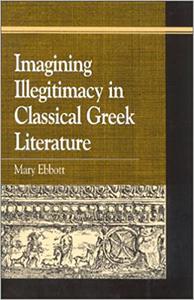
Mary Ebbott, "Imagining Illegitimacy in Classical Greek Literature"
English | 2003 | pages: 132 | ISBN: 0739105388, 073910537X | PDF | 2,1 mb
In Imagining Illegitimacy, Mary Ebbott investigates metaphors of illegitimacy in classical Greek literature, concentrating in particular on the way in which the illegitimate child (nothos) is imagined in narratives. Employing an approach that maintains that metaphors are a key to understanding abstract ideas, Ebbott connects the many complex metaphors associated with illegitimacy to the ancient Greek conception of illegitimacy. The nothos as imagined in ancient Greek literature is metaphorically connected to concerns about gender, reproduction, marriage, and concepts of polity. By decoding the metaphors of nothos mapped to these concepts, readers gain access into these ideas and their relationship to one another.
E-Books → The Fourth of August Regime and Greek Jewry, 1936-1941 (St Antony's Series)
Published by: voska89 on 12-02-2023, 02:22 |  0
0
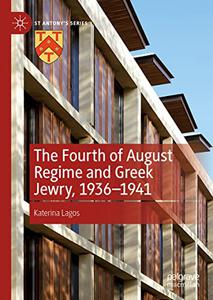
The Fourth of August Regime and Greek Jewry, 1936-1941 (St Antony's Series) by Katerina Lagos
2023 | ISBN: 3031205324 | English | 284 pages | PDF | 6 MB
Delving into a traditionally underexplored period, this book focuses on the treatment of Greek Jews under the dictatorship of Ioannis Metaxas in the years leading up to the Second World War. Almost 86% of Greek Jews died in the Holocaust, leading many to think this was because of Metaxas and his fascist ideology. However, the situation in Greece was much more complicated; in fact, Metaxas in his policies often attempted to quash anti-Semitism. The Fourth of August Regime and Greek Jewry, 1936-1941 explores how the Jews fit (and did not fit) into Metaxas's vision for Greece. Drawing on unpublished archival sources and Holocaust survivor testimonies, this book presents a ground-breaking contribution to Greek history, the history of Greek anti-Semitism, and sheds light on attitudes towards Jews during the interwar period.
E-Books → Unthinking the Greek Polis Ancient Greek History beyond Eurocentrism
Published by: voska89 on 11-02-2023, 06:14 |  0
0
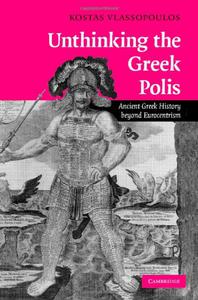
Kostas Vlassopoulos, "Unthinking the Greek Polis: Ancient Greek History beyond Eurocentrism"
English | 2011 | ISBN: 0521188075 | PDF | pages: 304 | 2.2 mb
This 2007 study explores how modern scholars came to write Greek history from a Eurocentric perspective and challenges orthodox readings of Greek history as part of the history of the West. Since the Greeks lacked a national state or a unified society, economy or culture, the polis has helped to create a homogenising national narrative. This book re-examines old polarities such as those between the Greek poleis and Eastern monarchies, or between the ancient consumer and the modern producer city, in order to show the fallacies of standard approaches. It argues for the relevance of Aristotle's concept of the polis, which is interpreted in an intriguing manner. Finally, it proposes an alternative way of looking at Greek history as part of a Mediterranean world-system. This interdisciplinary study engages with debates on globalisation, nationalism, Orientalism and history writing, while also debating developments in classical studies.



